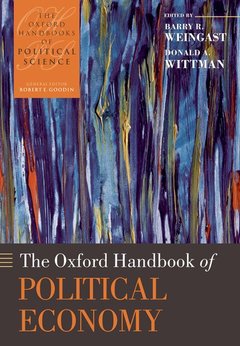The Oxford Handbook of Political Economy Oxford Handbooks Series
Langue : Anglais
Auteurs : Weingast Barry R., Wittman Donald

Over its long lifetime, "political economy" has had many different meanings: the science of managing the resources of a nation so as to provide wealth to its inhabitants for Adam Smith; the study of how the ownership of the means of production influenced historical processes for Marx; the study of the inter-relationship between economics and politics for some twentieth-century commentators; and for others, a methodology emphasizing individual rationality (the economic or "public choice" approach) or institutional adaptation (the sociological version). This Handbook views political economy as a grand (if imperfect) synthesis of these various strands, treating political economy as the methodology of economics applied to the analysis of political behavior and institutions. This Handbook surveys the field of political economy, with 58 chapters ranging from micro to macro, national to international, institutional to behavioral, methodological to substantive. Chapters on social choice, constitutional theory, and public economics are set alongside ones on voters, parties and pressure groups, macroeconomics and politics, capitalism and democracy, and international political economy and international conflict.
Introduction: The Nature of Political Economy. I. VOTERS, CANDIDATES, AND PRESSURE GROUPS. 1. Overview: Voters, Candidates, and Parties. 2. Rational Voters and Political Advertising. 3. Candidate Objectives and Electoral Equilibrium. 4. Political Income Redistribution. 5. The Impact of Electoral Laws on Political Parties. II. LEGISLATIVE BODIES. 6. Overview: Legislatures and Parliaments in Comparative Context. 7. The Organization of Democratic Legislatures. 8. Coalition Governments. 9. Bicameralism. III. INTERACTION OF THE LEGISLATURE, PRESIDENT, BUREAUCRACY AND THE COURTS. 10. Overview: Separation of Power. 11. Pivotal Politics. 12. Presidential Agenda Control. 13. Politics, Delegation, and Bureaucracy. 14. The Judiciary. IV. CONSTITUTIONAL THEORY. 15. Overview: Constitutionalism. 16. Self-Enforcing Democracy. 17. Constitutins as Expressive Documents. 18. The Protection of Liberty, Property, and Equality. 19. Federalism. V. SOCIAL CHOICE. 20. Overview: Social Choice. 21. A Toolkit for Voting Theory. 22. Interpersonal Comparisons of Well-Being. 23. Fair Division. VI. PUBLIC FINANCE AND PUBLIC ECONOMICS. 24. Overview: Structure and Coherence in the Political Economy of Public Finance. 25. Fiscal Institutions. 26. Voting and Efficient Public Good Mechanisms. 27. Fiscal Competition. VII. POLITICS AND MACROECONOMICS. 28. Overview:The Nonpolitics of Monetary Policy. 29. Political Business Cycles. 30. Voting and the Macroeconomy. 31. The Political Economy of Exchange Rates. VIII. DEMOCRACY AND CAPITALISM. 32. Overview: Democracy and Capitalism. 33. Inequality. 34. Comparative Perspectives on the Place of the State in the Economy. 35. Democratization. IX. HISTORICAL AND COMPARATIVE DEVELOPMENT AND NON-DEMOCRATIC REGIMES. 36. Overview. 37. Authoritarian Regimes. 38. The Developmental State. 39. Constitutional Design and Economic Performance. 40. Economic Geogrpahy. X. INTERNATIONAL POLITICAL ECONOMY. 41. Overview: International Political Economy: A Maturing Discipline. 42. National Borders and the Size of Nations. 43. European Integration. 44. Trade, Immigration, and Cross-Border Investment. XI. INTERNATIONAL RELATIONS AND CONFLICT. 45. Overview: Central Issues in the Study of International Conflict. 46. Ethnic Mobilization and Ethnic Conflict. 47. Democracy, Peace, and War. 48. Anarchy. XII. METHODOLOGICAL ISSUES. 49. Economic Methods in Positive Political Theory. 50. Experiments in Political Economy. 51. The Toolkit of Economic Sociology. 52. The Evolutionary Basis of Collective Action. XIII. OLD aamp, NEW. 53. Questions About a Paradox: Are There Answers?. 54. Politics and Social Inquiry: Retrospective on a Half Century. 55. The Future of Analytic Politics. 56. Modeling Party Competition in General Elections. 57. Old Questions and New Answers about Institutions: The Riker Objection Revisited. 58. What's Missing from Political Economy?.
Date de parution : 06-2008
Ouvrage de 1112 p.
17.4x24.7 cm
Épuisé
Thème de The Oxford Handbook of Political Economy :
© 2024 LAVOISIER S.A.S.



